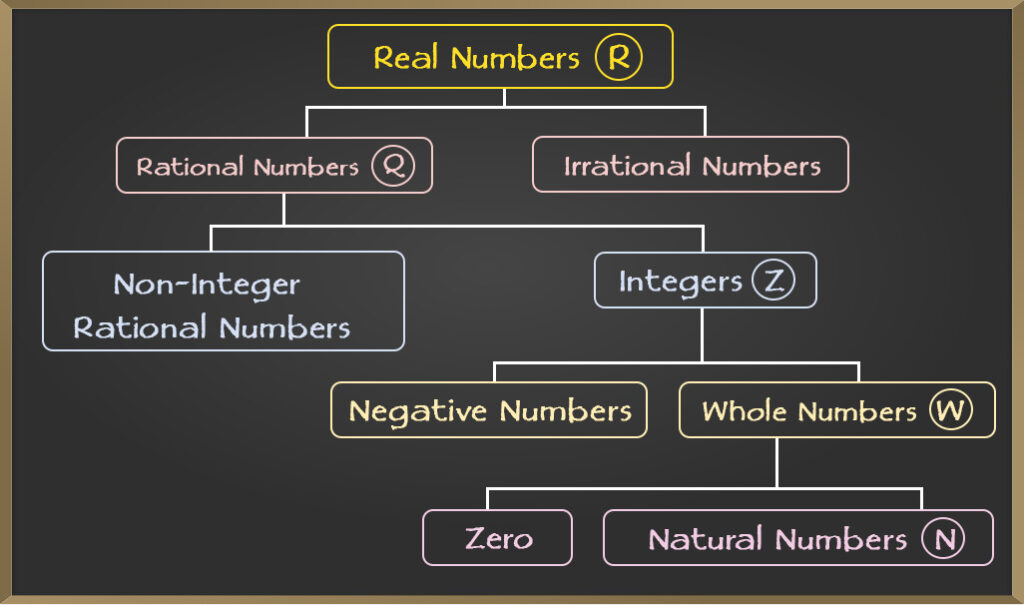EVERY THING YOU NEED TO KNOW ABOUT – REAL NUMBERS
Definition:
Real numbers are the set of all rational and irrational numbers, encompassing integers,
fractions, decimals, and irrational numbers such as π and √2.
Real numbers find applications in numerous aspects of human life, including:
- 1.FINANCE
- 2.ENGINEERING AND CONSTRUCTION
- 3.SCIENCE AND REASERCH
- 4.TECHNOLOGY AND COMPUTING
- 5.MEDICINE AND HEALTH CARE
- 6.SPORTS AND FITNESS
Human life connection and Applications:
- Finance: Real numbers are crucial in personal finance, accounting, banking, and
investments.
They are used for budgeting, calculating interest rates, managing debts, and analyzing
financial data. - Engineering and Construction: Real numbers are used in engineering and
construction for measurements, calculations, and design.
They are essential for determining dimensions, quantities of materials, structural
stability, and loads in buildings, bridges, and other infrastructure projects. - Science and Research: Real numbers play a vital role in scientific research across
various disciplines such as physics, chemistry, biology, and environmental science. - Technology and Computing: Real numbers are fundamental in computer science and
technology. They are used in programming, algorithms, data analysis, simulation, and
modeling.
Real numbers are also essential for representing data in digital systems and
communication protocols. - Medicine and Healthcare: Real numbers are used extensively in medicine and
healthcare for measurements, diagnostics, treatment planning, and research.
They are applied in medical imaging, laboratory tests, drug dosages, patient monitoring,
and epidemiological studies. - Sports and Fitness: Real numbers are utilized in sports and fitness for tracking
performance, setting goals, and analyzing data.
They are used to measure distances, speeds, scores, and physical attributes in various
athletic activities.

Reason for solving problems:
Solving mathematical problems involving real numbers is important for several reasons:
- Relevance to the Real World: Real numbers represent quantities and measurements
that we encounter in everyday life, making their understanding and manipulation
essential for practical applications in fields such as science, engineering, finance, and
technology. - Problem-Solving Skills: Working with real numbers enhances
Problem-solving skills,
Critical thinking, and
Logical reasoning.
Mathematical problems often require creative approaches and systematic methods to
arrive at solutions, which are valuable skills applicable in various contexts beyond
mathematics. - Foundation for Advanced Mathematics: Real numbers serve as the foundation for
more advanced mathematical concepts and structures.
Mastery of real numbers is essential for understanding topics such as calculus, analysis,
and abstract algebra, which form the basis of many branches of mathematics and their
applications. - Developing Numerical Literacy: Solving problems involving real numbers helps
develop numerical literacy and fluency, enabling individuals to interpret and analyze
quantitative information effectively. In today’s data-driven world, numerical literacy is
increasingly important for informed decision-making and problem-solving in diverse
fields. - Cognitive Development: Engaging with mathematical problems on real numbers
stimulates cognitive development by challenging individuals to think abstractly, make
connections between different concepts, and persist in problem-solving efforts. These
cognitive skills are valuable for academic success and lifelong learning.
Benefits:
Learning about real numbers offers several benefits:
- Understanding the World:
- Problem-Solving Skills:
- Preparation for Advanced Mathematics:
- Numerical Literacy:
- Cognitive Development:
- Career Opportunities:
- Understanding the World: Real numbers are used to quantify and describe aspects of
the physical world, such as measurements, quantities, and magnitudes. Learning about
real numbers helps individuals understand and interpret real-world phenomena more
accurately. - Problem-Solving Skills: Working with real numbers enhances problem-solving skills,
logical reasoning, and critical thinking abilities. Through solving mathematical problems
involving real numbers, individuals develop strategies for approaching complex
problems and finding solutions. - Preparation for Advanced Mathematics: Real numbers serve as the foundation for
more advanced mathematical concepts and branches, including calculus, analysis, and
algebra. Mastery of real numbers is essential for progressing to higher levels of
mathematics and exploring specialized areas of study. - Numerical Literacy: Understanding real numbers promotes numerical literacy,
enabling individuals to interpret, analyze, and communicate quantitative information
effectively. Numerical literacy is valuable in various fields, including science,
engineering, fin ance, economics, and everyday decision-making. - Cognitive Development: Learning about real numbers stimulates cognitive
development by challenging individuals to think abstractly, make connections between
different mathematical concepts, and engage in analytical reasoning. These cognitive
skills are transferable to other areas of study and life situations. - Career Opportunities: Proficiency in real numbers opens doors to a wide range of
career opportunities in fields such as science, technology, engineering, finance,
education, research, and data analysis
FINAL CONCLUSION:
Overall, learning about real numbers provides individuals with valuable skills,
knowledge, and insights that are applicable across various disciplines and essential for
academic success, professional development, and lifelong learning
